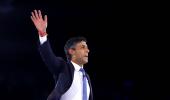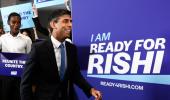Rishi Sunak was on Monday inching closer to become Britain's first Indian-origin prime minister after his former boss Boris Johnson quit the Conservative Party leadership race, saying it was 'simply not the right time' for his comeback.

With the former prime minister stepping aside on Sunday night, the prospect of a Diwali victory for 42-year-old Sunak seems a strong possibility.
The former chancellor, who said he wanted to 'fix our economy, unite our party and deliver for our country' when he declared his candidacy, has held a solid lead in the contest having comfortably surpassed the 100-MPs threshold to make the shortlist in time for the 1400 local time Monday deadline.
High-profile Tory MPs are switching allegiance from Johnson to Sunak, including former Home Secretary Priti Patel and cabinet ministers James Cleverly and Nadhim Zahawi.
Patel, the Indian-origin former minister who resigned from the cabinet when Liz Truss was elected the prime minister last month, said the Tories must put political differences aside to give Sunak the best chance of succeeding as the new leader.
Her intervention came as Sunak received the public backing of more than half the Tory MPs, setting him on course to become the country's first non-white prime minister.
Leader of the Commons Penny Mordaunt, the only other contestant in the race, has much ground to cover to hit the 100-MPs mark, giving rise to the possibility that the former finance minister may well be declared the new leader as soon as Monday evening.
If Sunak and Mordaunt both make the final shortlist, they would go forward for an online vote of the 170,000 Tory membership and that result on Friday would prove less predictable.
A Sunak victory would mark a remarkable turnaround in political fortunes for the former finance minister, who lost out to outgoing Prime Minister Liz Truss just last month after his popularity among party colleagues did not translate in the wider Tory membership vote.
Truss on Thursday announced her resignation as the prime minister after just 45 days in office, following an open revolt against her leadership in the Conservative Party.
"I am asking you for the opportunity to help fix our problems," said Sunak, in his latest campaign pitch, with reference to the economic turmoil he would be inheriting if he does go on to succeed Truss following a disastrous tax-cutting mini-budget last month.
"The United Kingdom is a great country but we face a profound economic crisis. That's why I am standing to be leader of the Conservative Party and your next prime minister," he said, promising 'integrity, professionalism and accountability' at every level of the government that he would lead and to 'work day in and day out' to get the job done.
The UK-born son of Indian-origin general practitioner father Yashvir and pharmacist mother Usha had spoken extensively of his migrant roots during the last campaign and also referenced making history by lighting Diwali diyas at 11 Downing Street as the first Indian-origin Chancellor of the Exchequer.
"Sixty years after my Naniji boarded a plane in East Africa, on a warm sunny evening in October, her great-granddaughters, my kids, played in the street outside our home, painted Rangoli on the doorstep, lit sparklers and diyas; had fun like so many other families on Diwali. Except the street was Downing Street, and the door was the door to No. 11," said Sunak, in his campaign video a few months ago.
That personal story also extended to a visibly emotional reference to his parents-in-law -- Infosys co-founder Narayana Murthy and Sudha Murthy -- as he hit back at attacks on his wife Akshata Murthy's family wealth.
"I'm actually incredibly proud of what my parents-in-law built," he said, during heated television debates over the past few months.
As a devout Hindu, Sunak is a regular at the temple where he was born in Southampton and his daughters, Anoushka and Krishna, are also rooted in the Indian culture.
He recently shared how Anoushka performed Kuchipudi with her classmates for the Queen's Platinum Jubilee celebrations at Westminster Abbey in June.
But beyond the personal, he also faced down attacks from his opponents over his record as Chancellor until his resignation precipitated Johnson's exit.
He stood firm on his focus on inflation rather than any vote-winning tax cut promises to woo a traditionally low-tax favouring Conservative Party membership base.
"I will get taxes down in this Parliament, but I'm going to do so responsibly. I don't cut taxes to win elections, I win elections to cut taxes," he declared.
His self-made credentials of working his way through a non-scholarship place at one of the United Kingdom's best schools, Winchester College, to a coveted Philosophy, Politics and Economics (PPE) from Oxford University and then an MBA from Stanford University as a Fulbright Scholar tick all the right boxes for the country's highest political office.
His private sector experience at Goldman Sachs and as a hedge fund manager seem to lend him the aura of someone who can be trusted in the face of harsh economic headwinds, further bolstered by his prescient warnings over Truss' unfunded tax cuts.
His political career began with winning a safe Tory seat of Richmond in Yorkshire in 2015 and from junior roles in the Treasury he was suddenly catapulted to the post of Chancellor of Exchequer when his former boss, Sajid Javid, resigned in February 2020.
He proved the doubters who feared his inexperience of high office would see him overpowered by his new boss, Johnson, wrong as he credibly led the economic response to the COVID pandemic.
He was constantly touted as the heir apparent to Johnson until that took a beating with some of his less popular tax hike policies in the wake of the pandemic and a partygate fine for attending a birthday event for his ex-boss in breach of lockdown rules.
In the latest chapter, the duo found themselves pitched for another face off for the top job in British politics.
This round seems to be firmly titled in favour of Sunak, and if he goes on to be elected the third British prime minister in three months, he faces the tough task of trying to unite a deeply divided Tory party at one of the most perilous times for the British economy.










 © 2025
© 2025